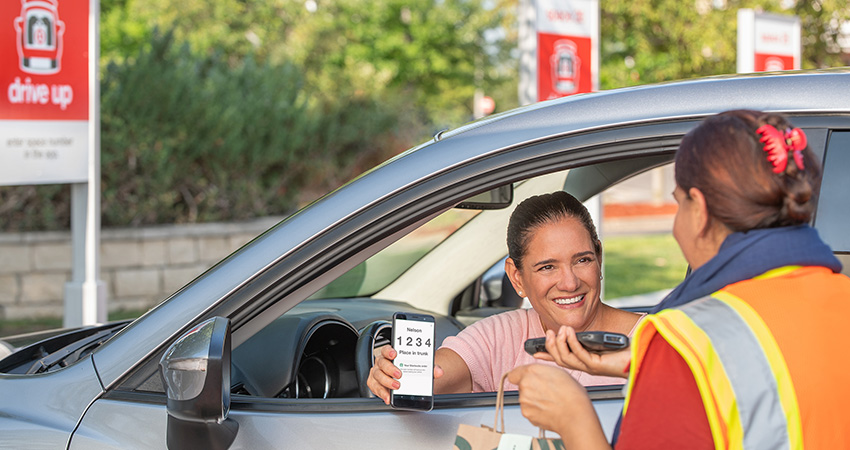Order #1234 is ready at a Target drive up, including a Starbucks (company photo)
Target reported weaker second quarter sales, acknowledging that some of it was due to backlash over its annual pride month collection in May, first from shoppers who reacted negatively to items like children’s clothing in front-of-store displays, then from LGBTQ groups angered by the company’s response.
However, Target’s earnings beat expectations, $1.80 per share vs. the analyst consensus of $1.39 per share, leading to a stock boost. New CFO Michael Fiddelke attributed the profit performance to being lean on inventory and efficiency efforts including automation. Operating income saw a massive jump, up 51.5% to $1.2 billion.
Target’s EVP and COO John Mulligan said 70% of the packages handled by the company’s new automated sortation centers, which operate downstream from its stores, were fulfilled within the local market. This allowed Target to utilize its Shipt division for last-mile services, achieving “meaningful efficiency and cost savings while offering much greater speed of delivery to our guests.”
On top of the pride reaction, CEO Brian Cornell said the company saw a 120% growth in shoplifting incidents that included “violence or threats of violence” to its associates in the first five months of this year, as retail theft nationwide has grown increasingly brazen and aggressive. Cornell said so-called “shrink,” i.e., theft or merchandise loss, was “well above the sustainable level where we expect to operate over time.”
He added Target is working with retail industry and community partners to find solutions that ensure the safety of guests and associates.
“Pride is one of many heritage moments that are important to our guests and our team, and we’ll continue to support these moments in the future … we’re focused on building assortments that are celebratory and joyous with wide-ranging relevance, being mindful of timing, placement and presentation,” Cornell told analysts on the earnings call. He also said some associates felt threatened by the pride backlash.
For the quarter, revenue at Target was down 4.9% to $24.8 billion, vs. $25.2 million expected by the Refinitiv analyst consensus. Comparable or same-store sales were down 5.4%, compared to company expectations of a low-single-digit decline. By comparison, TJX reported comps that were up 6% for the quarter, while main rival Walmart, which beat on the top and bottom line, saw them up 6.4%. The Bentonville giant also raised its full-year earnings forecast, while it was lowered at Target.
Fiddelke said Target’s lower comps were due to multiple factors, including the pride month backlash, a comparison against aggressive promotional activity in 2022 and shifts in consumer spending. Cornell noted, as have many other executives and analysts, that discretionary spending in general has shifted to travel, leisure and entertainment from larger-ticket retail goods.
Mulligan said Target has been “really pleased” with the positive response to the national rollout of its drive-up program this past spring to all 2,000 stores. Shoppers can pull up, pick up an order, make a return or even get a Starbucks drink, with a three-minute average wait time.
“We’ve long said that drive-up receives the highest satisfaction rating of any service we provide,” Mulligan said. “Today, based on what we’ve learned during the test period, we’re confident we can scale up this service while consistently maintaining our service standards.”
In terms of the company’s outlook, Fiddelke said the resumption of student loan payments “will put additional pressure on the already strained budgets of tens of millions of households.” He also said moderating inflation is causing a short-term negative impact on comps in “frequency” categories like food, beverage and essentials.
“Against this backdrop, we remain cautious in our planning, an approach that has served us really well so far this year,” he said.
Cornell also cited various macro factors as “an ongoing headwind,” including the rollback of government stimulus payments and higher child care tax credits, as well as soon-to-return student loan payments.

